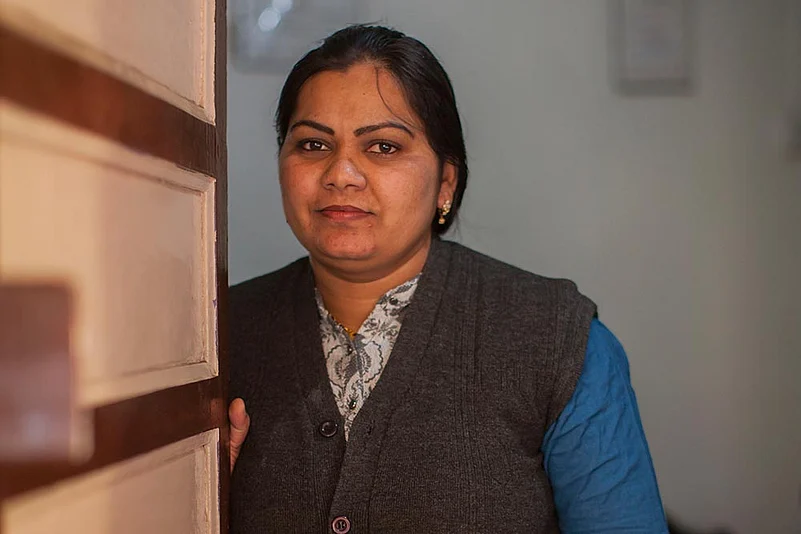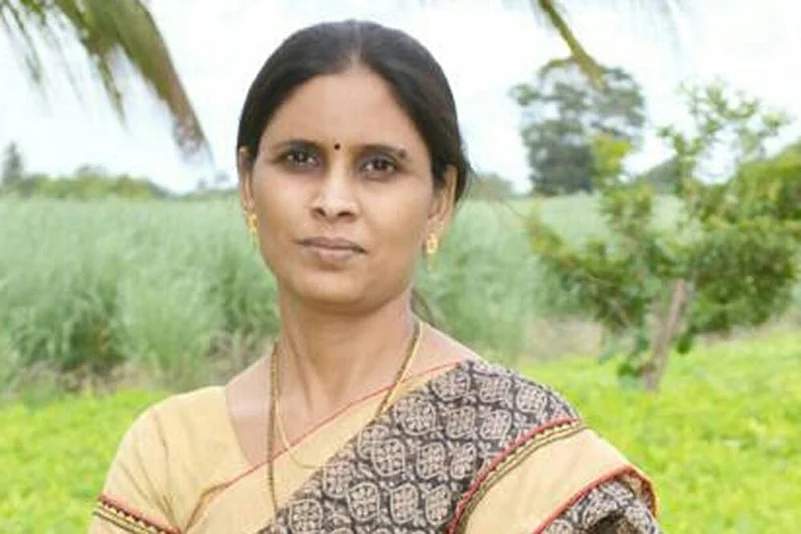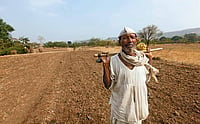Land Line
How easy it is dear,
Once you write off your land,
You can have any imported four-wheeler
Stand right at your door,
Have exorbitant acquisitions come home
Money can make anyone dance...
You can dress anyone in gold and silver.
Show off as a cent-minister
But my dear, will you hand over your heart to the system,
That extracts your mother’s heart?
You are right nonetheless...
There are no landlines anyway...
—Kalpana Dudhal
Last month, at the Maharashtra Foundation award ceremony, amidst celebrated writers and activists, Kalpana Dudhal, a petite, unassuming and soft-spoken poet from Boribhadak village in Pune district, took the microphone. Her speech started as a quiet monologue, but soon she had the audience—largely from Mumbai and Pune—enthralled. Many of them rushed to meet this powerful writer after the ceremony was over.
Dudhal’s second collection of poems, Dhag Astech Aaspaas (The Embers Are Always Around), has received the Foundation’s award this year. It follows her first book of verse, Maati Mhantey Caesar kar (The Earth Asks For A Caesarean), and has made her reputation as a path-breaking poet who brings to grimy life the miseries of centuries of agrarian crisis and pressures of globalisation on rural life.
The tribulations of rural life have always been a central concern of Marathi literature and there have been legendary women saint-poets like Bahinabai Chaudhari, Sant Janabai and Kanhopatra, but the canvas has been dominated by men. They still do but, with regular frequency in recent years, women writers have tried to break the twin manacles of poverty and patriarchy and voiced their anguish in literary works of searing, unforgettable quality. With their work being widely read and recognised, it is driving them to work harder on their craft and explore newer subjects. “I used to write poetry in college but I was married soon and had to return to farm work. I was restless for a long time...that is where poetry started coming to me. After a hard day’s work, the efforts and miseries of those around me became my subjects,” says Dudhal. Encouraged by the editor of Sakaal, Uttam Kamble, a well-known writer himself, her first collection came out in 2010.

Playwright Manaswini Ravindra was lauded by Vijay Tendulkar
Like Dudhal, Balika Bitale, 30, too writes about the struggles of rural folk. She was born in a settlement near Lonand village in Solapur district which didn’t have a school or electricity, and stayed with her uncle to attend school. After mid-school, when her family wanted to stop her education, Balika attempted suicide. Now, she is a constable in the police force at Pune. Her collection, Magazinitun Suttey Goli, (The Bullet Leaves The Magazine) not only talks about her fight as a woman, but also holds up a mirror to the police force—its inbuilt oppression, its male domination and rigid hierarchy. Bitale writes: They cannot digest/A slate and a book in my hand/Or the wisdom in my brains/They want me to follow orders, each one of them.../And they want me to perk my ears in attention,/As soon as they say, ‘Go Doggy Go!’/ How is it possible, you tell me?
“I am the second graduate from my village. The first was a girl who was allowed to study because she didn’t have hair, and hence no marital future. Reading Premchand made me want to write; teachers like Santosh Pawar helped in my studies, that gave me hope to do something. Now I want to pursue excellence, depth and knowledge,” says Bitale. Since she writes about the police in a brutally frank manner, isn’t she afraid of a backlash? “If my superiors took my work seriously, they would address some of the problems I write about. But I will never compromise with my writing,” she says. Bitale is now preparing for the civil service exams.
Shilpa Kamble, 40, shatters every stereotype of a Dalit writer. She is an income tax officer who spent her own money to publish her first, award-winning novel, Nilya Dolyanchi Mulgi (The Girl With Blue Eyes). She has also written plays and a couple of screenplays. Though she is firmly rooted in her Dalit identity, she says her ken goes beyond the Dalit movement, though her husband comes from the movement and her eight-year-old son has participated in rallies. Nonetheless, her writing is mostly about the marginalised. “The struggles show if you are true to the character’s conflict. I am not writing a thesis, first the audience has to be hooked and if you say what comes from within, it will be true,” she emphasises. Shilpa’s characters are deeply affected by the punishing world order—the multiple cankers of caste, class, gender and the inequities they spawn and sustain.
Though from different backgrounds, these women writers share a commonality—a burning resolve to transmute the conflict within into lasting art. Like Manaswini Lata Ravindra, a popular playwright whose first play was the forthright Cigarettes. She was only 20, and it was lauded by none other than Vijay Tendulkar. “I remember being restless. My parents were social activists; I grew up protected and under the impression that things are changing for the better. But I could not express my angst; I was an introvert. At Lalit Kala Kendra I found my metier and wrote the play,” says Ravindra, whose play Amar Photo Studio has won critical acclaim. Her husband Satish Manwar’s film Gabhricha Paus is one of the first films on farmers’ suicides.
Yet plays that speak uncomfortable truths and don’t pander to popular tastes don’t pay bills, and so Ravindra is forced to write TV serials. The compromise chafes constantly. “I don’t want to over-simplify things, as required by mainstream TV. Such writing exhausts you physically and mentally,” she says. Ravindra’s bitter weariness has a sympathetic listener in Shilpa, who says it is easier to work at a non-creative job and return to writing rather than spilling creative juices for TV serials. She is part of Scriptease, a group of writers and actors, who meet and discuss their work threadbare, unhindered by commercial pressure.

Poet-constable Balika Bitale, author of Magazinitun Suttey Goli
Established Marathi writers, now a generation older than these women, say it is gratifying to see so many new, young voices. “Changes are needed everywhere. Women continue to be at the bottom rung and have not been able to go beyond their pitiable state,” says celebrated poet Mallika Amar Sheikh. “For me, writing is an escape, not an actual solution, but writers themselves are suffering like farmers. There is chaos at literary meets, freedom of expression is curtailed, internet has exploded, so in all this to hold out and write truthfully is indeed very hard,” she adds, saying platforms like the Gateway Litfest for regional writing do help.
But the path to literary greatness is strewn with hardship. Kavita Mahajan, who published her first novel in 2005, says it has been an uphill task despite several awards and recognition. “They are useful, but don’t help in the actual pursuit of writing. I must be one of a few writers who makes a living only from writing, editing and translating and it is very hard. What young writers need, and I am not getting into challenges specifically faced by women, is financial support by way of fellowships,” she says. Completing her novel Bhinna, on HIV positive women, involved four years of back-breaking labour, she remembers.

Income tax officer Shilpa Kamble, author of Nilya Dolyanchi Mulgi
The internet and social media, of course, present other, newer outlets. Several women writers no longer wait to publish their work in Sunday supplements, Diwali issues or literary magazines—they simply post them online and are garnering enough traction for mainstream publishers to take note. For example, transgender activist Disha Shaikh, whose writing skewers social evils, or Vedhicka Kumaraswamy, who comes from a Devdasi background and will publish her book of poems this month, made their mark with online posts. “The way these women are talking about their experiences is original and heartfelt. Earlier, women’s writing may have been confined to the urban educated, but now there are writers like Vedhicka who was discovered by Kavita and we are thrilled to publish them,” says Asmita Mohite of Popular Prakashan, a prominent publishing house in Maharashtra.
Last year, Mangesh Kale, who brings out a quarterly on literary trends in Marathi, had dedicated a special issue to new women writers. “They are all writing with uninhibited, fearless voices about subjects that affect them. That’s the real change with these writers,” he says. “I can see so many hands writing on the horizon of Marathi literature now. It was difficult in the 1990s when we waited endlessly for publishers to notice our writing in papers and magazines. But then, the movements also collapsed with globalisation, as Marathi was relegated to a regional language. Today’s women writers are fighting a three-fold fight—casteism in metros, patriarchy and pressures of globalisation. They are holding fast to their creative force despite institutional patriarchy trying its best to slot them into boxes,” says Marathi writer and poet Pradnya Pawar.
Those battles are being fought with a tenacious gusto. Bitale wears the stifling nature of her constable’s job with honesty. “The title of my collection is about that space when the trigger is pulled, but the bullet hasn’t fired. I am quietly and firmly exploring that space,” she says. Kamble doesn’t shy from the extreme restlessness of the moment when she heard of Rohit Vemula’s death. “I was making ghee, for my son—an act that is not part of Dalit life or Dalit struggle. I went blank, it was painful—the struggles that remain are a reality. It is that moment to which I am truthful.” Ravindra derives her highest satisfaction from layering her work. “I try to enter the skin of characters, even men, and I strive not to keep it simple.” The jhola, with a notebook and a pen in it, travels with Dudhal daily to the farm and comes back after a punishing day in the field, often untouched. Yet somehow her experiences and thoughts have miraculously started to take fierce shape in those pages. Raw notes like hers are propelling a literature forward.
By Prachi Pinglay-Plumber in Mumbai


























